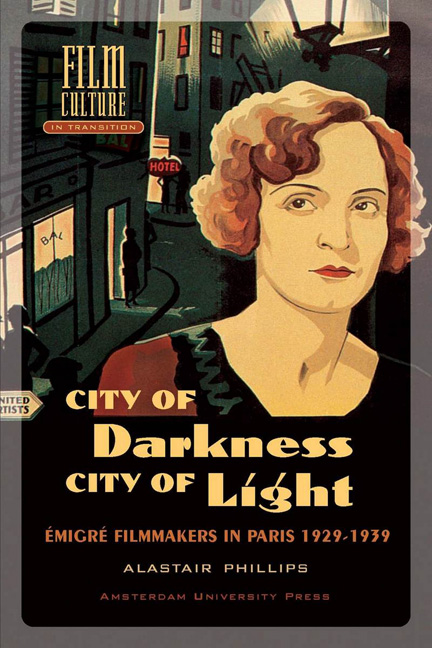Book contents
- Frontmmatter
- Contents
- Acknowledgements
- Chapter One Introduction
- Chapter Two The City in Context: An Historical Ambivalence
- Chapter Three City of Light: Paris as Spectacle
- Chapter Four City of Darkness: The Camera Goes Down the Streets: ‘The Hidden Spirit Under the Familiar Façade’
- Chapter Five Divided City: The Divided City in Context
- Chapter Six Conclusion
- Notes
- Appendices
- Filmography
- Bibliography
- Index
- Film Culture in Transition General Editor: Thomas Elsaesser
Chapter Two - The City in Context: An Historical Ambivalence
Published online by Cambridge University Press: 25 January 2021
- Frontmmatter
- Contents
- Acknowledgements
- Chapter One Introduction
- Chapter Two The City in Context: An Historical Ambivalence
- Chapter Three City of Light: Paris as Spectacle
- Chapter Four City of Darkness: The Camera Goes Down the Streets: ‘The Hidden Spirit Under the Familiar Façade’
- Chapter Five Divided City: The Divided City in Context
- Chapter Six Conclusion
- Notes
- Appendices
- Filmography
- Bibliography
- Index
- Film Culture in Transition General Editor: Thomas Elsaesser
Summary
In his evocative and modestly tempered account of the complex nature of the relationships formed between Parisians and their German occupiers during the SecondWorldWar, Richard Cobb rightly seeks to demonstrate the range of feelings available within the framework of this situation. Instead of painting a picture which conveys an unambiguous clash between the values of lightness and dark; he argues that, certainly at the metropolitan level, “relations between occupants and occupés were obscured, twisted and complicated by all sorts of nuances of personal relations, ranging from mutual trust to a jarring acrimony” (1983, 60). This question of cultural ambivalence frames the history of the encounters between the two countries. If one goes back to the beginning of the nineteenth century, for example, Napoleon formally banned Madame de Staël's enthusiastic collected writings on the literary and philosophical culture of the German states entitled De l’Allemagne (1810). An interest in German intellectual life persisted, however, with the founding of the Nouvelle Revue Germanique in 1829 by Marquis Edouard de Lagrange. Meanwhile, for many German cultural figures such as Ludwig Börne, and Heinrich Heine who first moved to the city in 1831, Paris represented a beacon of free intellectual and literary expression. In Heine's writings, he referred to its “gracious and civilised air” (in Kruse andWerner 1981, 97). Like many others, he saw the city as more than just the capital of one nation. For him, Paris, then the largest city in Europe, also stood as the capital of the enlightened values of the European world. Asequence of travel books and memoirs followed from German writers based temporarily in Paris (Gleber 1999, 6-12). Throughout the nineteenth century, admiration within the Parisian intelligentsia for the liberating currents of German idealist philosophy was consistently tempered by a sense of trepidation regarding the military strengths of their near neighbour. Michelet wrote of “my Germany, the scientific power that alone has made me study questions deeply, and given Kant, Beethoven, and me a new faith” (in Zeldin 1993, 116); yet it was this same national culture that fought with such vigour and animosity during the campaign of the 1870 war to annex Alsace-Lorraine. France's divided perception of the German nation became, by the end of the nineteenth century, split in two once more. This time it was along the lines of political allegiance.
- Type
- Chapter
- Information
- City of Darkness, City of LightÉmigré Filmmakers in Paris 1929–1939, pp. 21 - 72Publisher: Amsterdam University PressPrint publication year: 2003



